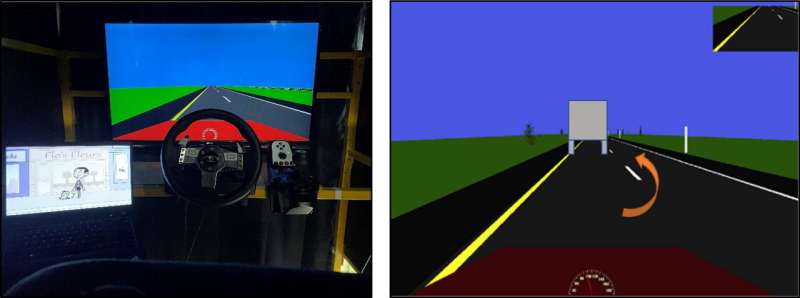This article has been reviewed according to Science X's editorial process and policies. Editors have highlighted the following attributes while ensuring the content's credibility:
fact-checked
trusted source
proofread
Driverless cars are no place to relax, new study shows

Early data on activities that will be unsafe to undertake in automated vehicles has been released. From doing work to watching the world, from social media to resting—preliminary results are in.
Research led by RMIT University looked at what happens if a driver is suddenly required to take control of an automated vehicle, such as in an emergency.
The series of papers examines how experience and three types of distractions (work, social media and rest) impacted on the driver's ability to respond.
Study lead author in the School of Engineering, Dr. Neng Zhang, said authorities need to begin drafting policies to regulate the responsible use of automated vehicles before Level 3 and 4 automated vehicles appear on Australian roads.
While the National Transport Commission has outlined a regulatory framework for automated vehicles in Australia, driver training, licensing and obligations are still being considered.
Laying the road to regulation
There are five levels of vehicle automation. Already, Level 1 and Level 2 are common through features such as lane keeping, automated parking and cruise control. More advanced automated vehicles—what we think of when we say 'driverless cars'—are currently being trialed but are not yet commercially available in Australia.
"In Level 3 and 4 automated driving, the human driver will still need to respond in an emergency, taking control of the vehicle," said Zhang.
"This data is a starting place for regulation and could lead to data-backed legislation that ensures drivers are given enough time to respond quickly and flawlessly to emergency events."
A study of distraction
Using a Level 3 automated vehicle simulation, the researchers tested participants' speed and effectiveness in taking over the vehicle in the event of an emergency.
"We had them writing business emails (working condition), watching videos (entertaining condition), and taking a break with their eyes closed (resting condition)," said Zhang.
"These tasks required drivers to invest high, moderate, and low levels of mental workload. We tested their responses after a short interval (five minutes) or long interval (30 minutes) of participating in one of these tasks. All of these tasks worsened the takeover and led to a period of poorer driving.
"We found that resting resulted in the worst takeover response, followed by working. Social media was less disruptive. However, the longer the participant engaged in an activity, the worse their response was to an emergency."
The cross-disciplinary research team brought together RMIT expertise in human body vibration, automotive engineering and cognitive psychology from the School of Engineering, School of Health and Biomedical Sciences and School of Science.
Biomedical researcher and author on the papers, Professor Stephen Robinson, warned that emergencies require a high level of cognition.
"As soon as something unexpected happens, such as a child running across the road, we need to be able to use our full cognitive abilities to assess the situation and take appropriate action," said Robinson.
"Takeover requests in automated vehicles occur when the onboard computer lacks the capacity to deal with changed or complex driving conditions. Such conditions are potentially dangerous and require the driver to focus quickly and act decisively to keep our roads safe."
Young drivers to struggle with emergency takeovers
In addition to distractions, the study looked at the experience of drivers with a focus on young people.
"We found that driving experience and takeover performance were highly correlated, with inexperienced drivers (with less than 20,000 kilometers of driving experience) responding more slowly and less effectively. The distance driven since gaining a driver's license is more important than the number of years since the license was issued," said Zhang.
"Our findings highlight the need for vehicle manufacturers and licensing authorities to develop solutions that ensure that conditionally automated vehicles are safe for drivers with varying experience levels."
Driving research to back legislation
The paper, "Is driving experience all that matters? Drivers' takeover performance in conditionally automated driving" was published in the Journal of Safety Research .
It builds on an earlier paper, titled "Influence of non-driving related tasks on driving performance after takeover transition in conditionally automated driving" published in Transportation Research Part F: Traffic Psychology and Behaviour in mid-2023.
The team is now investigating how to stimulate alertness and improve effectiveness of driver takeovers.
Engineering expert and author on the papers, Professor Mohammad Fard, explained that seamless and safe transition between vehicle automation and human is the goal.
"The aim of our work is to enhance 'human-automation interaction' for autonomous vehicles and significantly improve the way humans interact with and control these advanced autonomous vehicles, leading to enhanced efficiency and safety in their operation," said Fard.
However, there is a limit to what the engineering and design of autonomous vehicles can achieve. The researchers emphasized that regulations must also address issues such as distraction, alertness and experience before Level 3 automation can be successfully adopted in Australia.
"Governments can effectively safeguard road safety by acknowledging these detrimental effects and regulating non-driving activities in the context of autonomous driving."
More information: Neng Zhang et al, Is driving experience all that matters? Drivers' takeover performance in conditionally automated driving, Journal of Safety Research (2023). DOI: 10.1016/j.jsr.2023.08.003



















